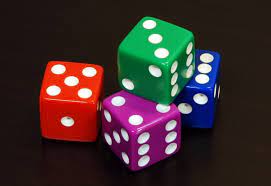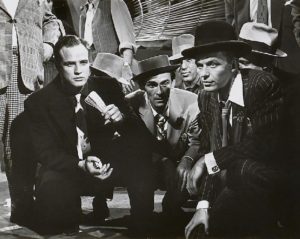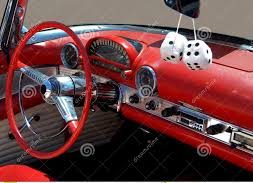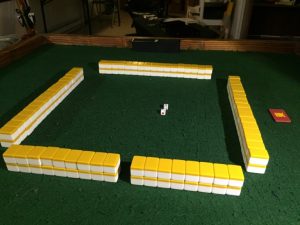
When I was growing up, my family had a ton of board games, and a finished room in the basement where we kept them all and played them with our friends or with each other. All of them involved rolling dice to determine which way or how far you moved your token. Chiefly I remember Parcheesi and Chutes & Ladders when I was really young (I loved climbing those ladders and sending others down the chutes), Monopoly and Clue when I was older, and finally Trivial Pursuit when that came out in 1981 and was all the rage for a while. I still like Clue, perhaps even better now after thirty years of practicing law. Trying to determine the killer, the weapon, and the room where the murder took place is a great exercise in deductive logic for all ages.
Board games with dice, mah jongg with dice, and the oldest established permanent floating crap game in New York.
We started many games of Monopoly over the years, but it was rare that we finished a game, because it took so long for someone to win. It was only many years later that I realized what the game was trying to teach us – that the way to succeed was to acquire a monopoly and therefore be able to extract exorbitant amounts of money from other people for using that monopoly. Indeed, the word “monopoly” only came into my vocabulary as the name of this board game, and it might have been in college that I first understood that it meant having the exclusive possession or control of some commodity. As a child I was more interested in the fact that all the properties in the game were named after streets in Atlantic City, and since we went to Atlantic City every year for my father to attend a medical convention, I liked to look for the streets that were in the game. We always walked on the Boardwalk, so that one was easy; some of the others were harder to find.
But back to dice . . . .
In all the board games I played, the dice were important because they told you how far to move your game piece.
In contrast, mah jongg, which I play now, uses dice in a very different way. In the first game of a session, everyone rolls the dice to determine who is East (like the dealer, but this person gets one extra tile and discards first), although in subsequent games the role of East rotates around the table. More importantly, a roll of the dice by East determines where the first wall is “broken” – akin to cutting the deck in cards – with part of the wall being moved out for immediate play, and the rest (equal to the number rolled on the dice) reserved to the end of the game. Neither function of the dice has any impact on the progress of the game, however, and a game could still be played even if you didn’t have dice, whereas none of the board games could be played without dice.
The only game I know that is played exclusively with dice is craps, and I only know that game from the wonderful musical Guys and Dolls. For those who don’t know the story, a character named Nathan Detroit runs “The Oldest Established Permanent Floating Crap Game in New York.” I knew all the words to the song with that title before I had any idea what it meant.  What’s a crap game? What is a floating crap game? How can the game be permanent if it is floating? I didn’t ever stop to wonder about those questions, I just enjoyed singing the song. Once you see the show (or the movie) it makes sense, but I listened to the original cast album long before I actually saw the show. It opened on Broadway in 1950 and ran for more than three years, but I obviously was too young to see it then. There was a Broadway revival in 1976, so I may have seen that, but it is likely that I saw it in a regional theater or summer camp production much earlier. Anyway, that’s how I know about craps. (The photo is of Marlon Brando and Frank Sinatra shooting craps in the 1955 film version. Hard to tell what they’re doing, but Brando is holding the dice in his hand.)
What’s a crap game? What is a floating crap game? How can the game be permanent if it is floating? I didn’t ever stop to wonder about those questions, I just enjoyed singing the song. Once you see the show (or the movie) it makes sense, but I listened to the original cast album long before I actually saw the show. It opened on Broadway in 1950 and ran for more than three years, but I obviously was too young to see it then. There was a Broadway revival in 1976, so I may have seen that, but it is likely that I saw it in a regional theater or summer camp production much earlier. Anyway, that’s how I know about craps. (The photo is of Marlon Brando and Frank Sinatra shooting craps in the 1955 film version. Hard to tell what they’re doing, but Brando is holding the dice in his hand.)
Finally, some other thoughts about dice. There are so many expressions in the English language related to dice. “No dice” means I’m not gonna do it. “The dice are loaded” means things are not going to turn out well. Calling a situation a “crap shoot” means it is risky or uncertain, and describing something as “dicey” also means it is risky or even dangerous. And then there are those fuzzy dice that people used to hang from the rear view mirror of their car, which were supposed to bring good luck. Does anyone still do that?
“The dice are loaded” means things are not going to turn out well. Calling a situation a “crap shoot” means it is risky or uncertain, and describing something as “dicey” also means it is risky or even dangerous. And then there are those fuzzy dice that people used to hang from the rear view mirror of their car, which were supposed to bring good luck. Does anyone still do that?
- * * *




Just a terrifically inclusive and enlightening collation of dice games and other dice-related materials, Suzy. Indeed, so many of the points you made resonated with me that I hardly know where to begin to comment on them.
But, in brief:
*I was glad to see you also liked Clue so much. Perhaps there is a correlation between that and later becoming a lawyer. And, like you, I don’t think I ever finished a Monopoly game.
*I know nothing about mah jongg other than that it uses tiles and what you’ve written before. So thanks for the continued enlightenment.
*I also loved “Guys and Dolls” and particularly the craps scene in the sewer which you picture.
*As to the fuzzy dice, anytime I see someone out driving a big, beautifully refurbished 50’s or 60’s car — particularly a convertible — it usually has them hanging from the rear view mirror (as they should be).
Thanks for all the memories!
Thanks, John, for your “brief” comment 🙂 I made it a little briefer by deleting your explanation of the plot of Guys and Dolls. Hope you don’t mind.
Wonderful story Suzy!
Of all the games you mention I remember liking Clue best – and I’m not even a lawyer!
And in my book – of all the Broadway musicals, Guys & Dolls is as close to perfection as one can get.
Do you remember why the back of the police station is out?
Dana, he never says why the back of the police station is out, he just says “things bein’ how they are” – I guess meaning that the cops are no longer turning a blind eye?
Yes Suzy, or maybe Loesser meant since the game is illegal, the police station’s not such a good idea!
But funnier lines are about that bad sport Mrs McClosky!
I don’t think she was a bad sport – he says she “ain’t a good scout” meaning she isn’t good at keeping an eye out for the cops.
Ah, thanx for pointing that out Suzy, you do have a lawyer’s acumen!
And I’m sure you agree it’s a gem of a show!
Great description of your dicey encounters through the years, Suzy. I love that you actually got to go to Atlantic City when your father went to his medical convention and you’d look for the streets from the game; what fun!
Thank you for explaining the rules of mah jongg. I know lots of women who play but I don’t have a clue what it’s all about so this was very helpful. I may return to this from time to time.
Of course, I know and love “Guys and Dolls” on an intimate basis, having been in it in college (and one of Dan’s sisters was in a production in high school – it is very popular still).
Here’s a good story for you about Nathan Detroit. I heard from a cousin several years ago about his grandmother, Anna Steinberg Prentis (her husband, my great uncle, was treasurer of GM during WWII, when it was the largest corporation in the world). Anna had been Meyer’s secretary, so she didn’t come from wealth. She had two brothers. One was Nathan Steinberg, who ran a floating crap game in Detroit! If the heat got too hot, he’d run across the border to Canada. Damon Runyon based the character on Anna’s brother, the brother-in-law of the treasurer of General Motors! I howled when I heard that one.
Love the story about Nathan Steinberg aka Nathan Detroit! I do recall that you were in “Guys and Dolls” as the beautiful and demure Sarah Brown. If I had ever had the chance to be in that show, I would have wanted to be Adelaide! One of my (many) complaints about the movie is that they cut the song “Bushel and a Peck,” which my mother sang to me when I was little, and I sang to my children too.
Of course, I totally agree about the movie. You and I would have been a great pair as Sarah and Adelaide – Marry the man today and change his ways…tomorrow! (I’ll send you the photo from my production, fists raised in the air.)
Wow, Suzy…there have been loads of dice in your life…not to be confused with loaded dice, of course. I’ve played and enjoyed all of them except for mah jongg (which auto correct really wants to make “Mahle joining”).
Interesting (at least to me) that dice are part of the game but not actually necessary, similar to the fact that, as I’ve just recently discovered, a cribbage board is not necessary to play cribbage … it’s simply a means of keeping score. Tradition in both cases, I guess.
Finally, I personally bought a pair of fuzzy dice for my high school sweetheart to hang from the rear-view mirror of his first car…a ’57 two-tone baby-blue-and-white Ford Fairlane with baby moon hubcaps. I don’t know if they brought him luck…maybe so, because it wasn’t long after that that he dumped me for a new girlfriend.
Funny about the fuzzy dice – I’d say it was very bad luck for your HS sweetheart that he decided to dump you!
P.S. I know you had a song about dice in mind – was it the one I chose?
Yes!! So glad you chose it … I forgot to mention that in my comment!
Wonderful recap, Suzy, especially about Guys & Dolls and the various games. In my family, we did finish Monopoly games, but mostly when we were in Beach Haven for the summer. We just kept the board as is for days until someone won.
Thanks, Mare. Good to know that someone finished Monopoly games – but also that it took several days!
Clue is still huge fun. We played it with our 12-year-old grandson, whose skills of logic and deduction far exceed mine, I still enjoy a good game of Monopoly, despite the 3+ hours it takes to bankrupt all of the players and win. I also loved Guys and Dolls and have seen many versions of it. And I enjoyed your last paragraph detailing many common expressions that come from dice play,
Thanks, Laurie. Good to know you are passing your love of board games on to your grandchildren.
I loved Clue! Certainly a favorite board game. Mah jongg completely eludes me as do most card games. I’ve learned how to play bridge over a dozen times, always taught by someone with near-holy patience, hearts the same. I can master blackjack — I even have a betting formula, altho I just realized I’ve forgotten that, too. My father taught me how to play craps and I’ve even dared play that (and blackjack or 21) in casinos but for the most part, dice and card games are just no dice for me.
I’ve often seen low-riders here in LA with big fuzzy dice hanging from the mirror, so that custom still lives!
Guess we should plan a rousing game of Clue at our in-person Retro gathering, whenever that occurs. Glad to hear about the low-riders in LA, I’ll have to check them out here and see if they have fuzzy dice too.
Suzy, your story time-warped me to a late afternoon in winter in the 1950s, curled around a game board in the parlor with my sibs as the light of day crept away. Lots of sepia, and running noses, and nothing else to do. One ersatz solution to the endless Monopoly game is to play by modified rules, including distributing properties at the outset, adjusting the money supply (for which you might need advice from the Federal Reserve), cutting side deals (a la “Survivor”), and playing by a time clock (like they talk about implementing in baseball to deal with the slow, endless innings; but no more baseball talk from me). And also, what was learned, or absorbed, from all the hopes for good dice luck — hoping to avoid Boardwalk, to hit Free Parking, to land on yellow properties that no one wanted buy? There may be a clue to this in abstention cultures where they ban gaming because it undermines the essential message that there are no short cuts, that luck has nothing to do with it, that only hard work and clean hands will evidence divine grace. I think in the formative days of America they would have burned you at the stake for playing Monopoly.
What a great comment! Thanks, Jon!